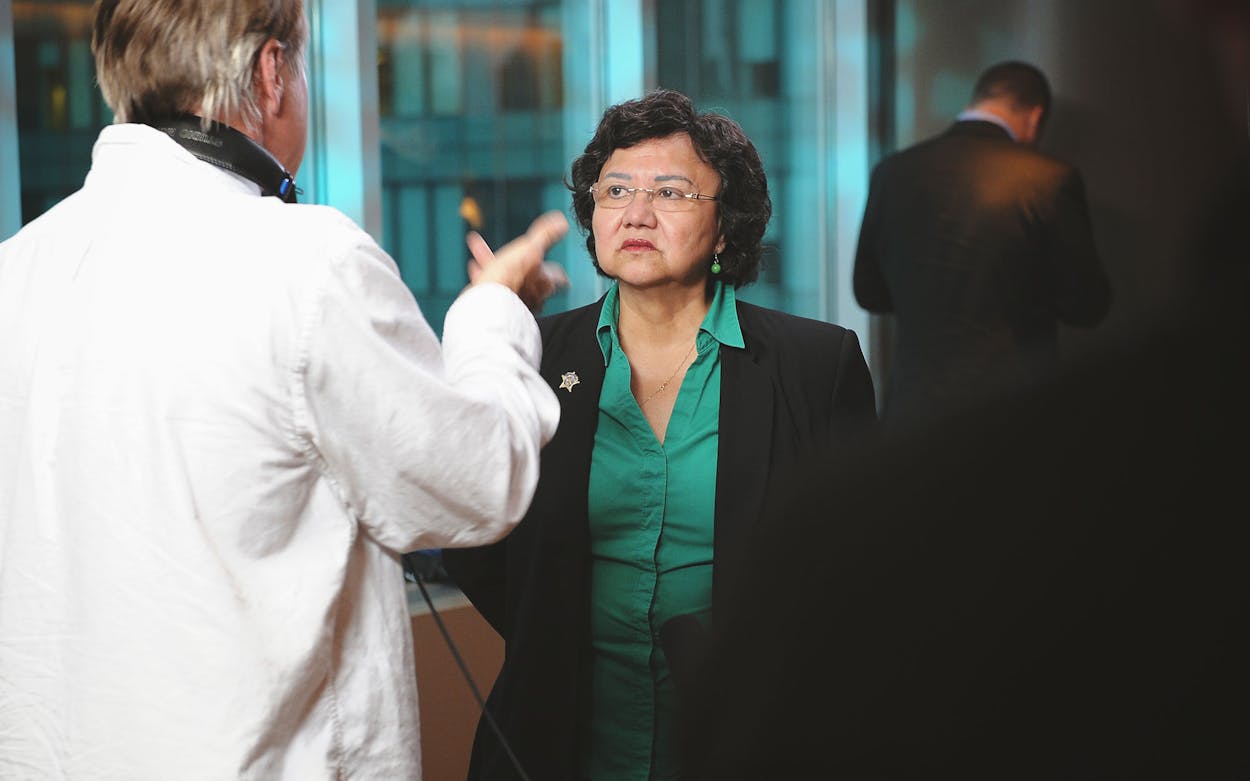At the climax of the 1970 movie Little Big Man, the character of General George Armstrong Custer stands at the top of a hill at Little Big Horn and asks a scout whether he should attack the Native American camp below. “There are thousands of Indians down there,” says the scout, a character named Jack Crabb who hates Custer. “And when they get done with you, there won’t be nothing left but a greasy spot.” Using a fallacious circular logic, Custer decides Crabb is trying to keep him from attacking by telling him to attack: “The subtle truth is you really don’t want me to go down there!” Having reassured himself, Custer leads his men into annihilation by attacking the camp of Sioux and Cheyenne.
That scene poured back into my head this morning as I saw Governor Greg Abbott’s online advertisement touting former Dallas County Sheriff Lupe Valdez to be his presumptive fall opponent as the Democratic nominee for governor. Of course, this comes on the eve of Valdez facing off against Houston businessman Andrew White to reassure her party voters that she really does have what it takes to carry the party banner for governor.
Is Abbott’s campaign using some Jack Crabb logic to tell Democratic voters that he fears they will nominate Valdez in the May 22 runoff when he really does want them to nominate Valdez as his Democratic opponent for the general election? As Crabb said to Custer: “You go down there, General, if you’ve got the nerve.”
Abbott launched a website called “Wrong for Texas,” along with a video called “Lupe Valdez, Too Liberal for Texas.” She responded with an endorsement from former U.S. housing secretary Julián Castro and her own statement: “I know first hand the importance of looking out for all Texans not just corporations and well connected CEOs. The New Texas that I’m fighting for is one where all Texans have opportunities to succeed. There is nothing too liberal about that.” From the broader perspective, the exchange was just a continuation of Abbott’s attempts to define Valdez for a statewide audience before she has a chance to do so while seemingly promoting her nomination by giving her publicity.
In an election year when no Democrat with statewide name identification stepped up to run, Valdez looked like an ideal party candidate—on paper at least. She had an impoverished childhood and made something of herself by attending college and obtaining a master’s degree in criminology. She rose to the rank of captain in the U.S. Army before starting a career with the U.S. Customs and Border Protection, then winning election as Dallas County sheriff in 2004 by defeating a Republican. She is also in a same-sex relationship.
A Hispanic gay woman in law enforcement who had proven herself in elective politics, Valdez seemed to have it all going for her. She had everything except a knowledge of state government and seemed to lack a willingness to learn. Andrew White, a Houston investor and the son of a former governor, looked like he represented the Democratic Party of yore, not the new multicultural party. He finished a distant second in the primary voting, but then Valdez started stumbling. The party faithful began a debate over whether it is better to support a candidate like Valdez, who represents the party base, or a candidate like White, who might actually have a chance of defeating Abbott.
The first hint that Valdez might be in trouble came as the Houston GLBT Political Caucus endorsed White over Valdez. Then her hometown newspaper, the Dallas Morning News, endorsed White, saying Valdez was unprepared for her editorial board interview: “At one point, Valdez, 70, volunteered that she didn’t know whether the state was spending $8 million or $8 billion on border control. (It’s closer to $800 million.) On college tuition, she first suggested the Legislature “‘and stakeholders’ should set tuition rates, but then contradicted herself, and she later said the state should move to reduce local property tax rates, apparently unaware of those set by local jurisdictions.”
Then late last month, Valdez was shocked when she lost the endorsement of the new Hispanic activist group Jolt because she could not demonstrate that she had been adequately strong on protecting undocumented immigrants from deportation—despite her opposition to Abbott’s sanctuary cities law. As Jonathan Tilove at the Austin American-Statesman described it: “Lupe Valdez talks Latinx activists into backing the White guy for governor.”
The liberal Austin Chronicle on Friday noted that it had endorsed Valdez in the primary but was withdrawing any endorsements for governor in the runoff between Valdez and White. “We sincerely hope and frankly urge Texas Democrats to see this gubernatorial election as a true wake-up call, and to work harder to motivate and enlist formidable candidates during the next election cycle.”
The Valdez campaign that had been avoiding an actual debate with White was suddenly eager for one after the Jolt fiasco. It will occur on Friday evening at a church in Austin. KXAN/KXAS/Nexstar stations are the only ones allowed to livestream the debate, while Charter Spectrum will carry the debate live.
This is not a debate between major contenders, though. (As of the last reporting period, Valdez had $57,000 in the bank; White, $1 million; and Abbott, $41 million.) Texas Democrats have the longest partisan losing streak in statewide elections of any party in the nation. With tens of millions of dollars at his disposal, Abbott has little to worry about from either White or Valdez, but if Valdez does not improve, if she does not study the statewide issues, if she continues to stumble, she could lead the party’s down-ballot candidates into defeat with her. Abbott, to paraphrase Jack Crabb, seems to be saying, “You go down there, Democrats, if you’ve got the nerve.”
- More About:
- Politics & Policy
- Lupe Valdez
- Greg Abbott






